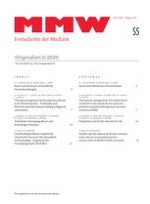Erschienen in:

17.07.2020 | Zytokine
Stress und chronisch-entzündliche Darmerkrankungen
verfasst von:
Prof. Dr. med. Peter Christopher Konturek, Kathrin Konturek, Prof. Dr. med. Yurdagül Zopf
Erschienen in:
MMW - Fortschritte der Medizin
|
Sonderheft 5/2020
Einloggen, um Zugang zu erhalten
Zusammenfassung
Stress wirkt sich durch unterschiedliche Mechanismen negativ auf den Verlauf einer chronisch-entzündlichen Darmerkrankung aus. Zu den wichtigen Mechanismen gehören u. a. eine verstärkte Freisetzung proentzündlicher Zytokine, Darmdysbiose, erhöhte Permeabilität der Darmbarriere, verstärkte Freisetzung von CRF (corticotropin-releasing factor) im Gehirn, Aktivierung der Mastzellen in der Darmschleimhaut und unzureichende zentrale Schmerzverarbeitung mit den Folgen Angst und Depression. All diese Faktoren können die entzündliche Reaktion am Darm verstärken und zum akuten Schub führen. Aus diesem Grund ist ein entsprechendes Stress-Management von außerordentlich wichtiger Bedeutung für den Therapieerfolg.